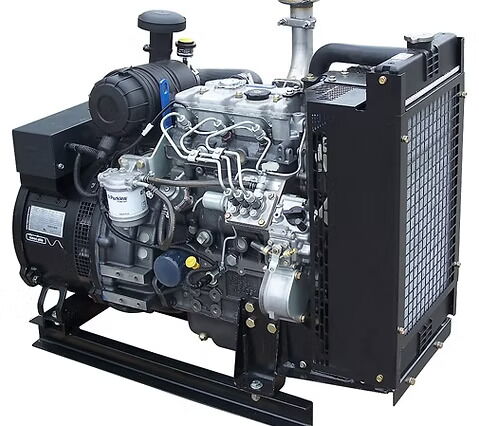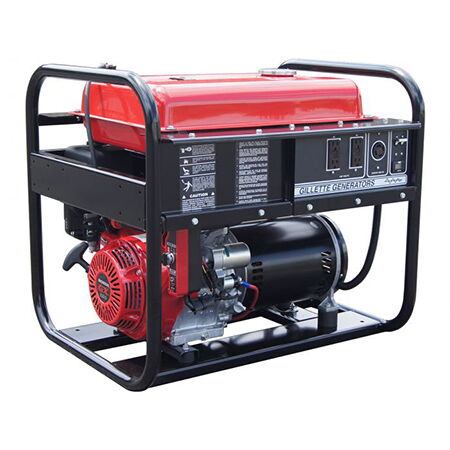In modern society, power generators have become an essential power source for various industries and households. Whether for commercial use, industrial applications, or emergency power for personal homes, power generators provide reliable electricity. Among the numerous types of generators available, diesel and gasoline generators are the two most common options. Each has its advantages and disadvantages, making them suitable for different application scenarios and needs. In this article, we will delve into the working principles, pros and cons, fuel efficiency, applicable scenarios, and maintenance requirements of diesel and gasoline generators, helping you make the best choice based on your specific needs.
Diesel generators are favored for their high efficiency, long service life, and lower operating costs, making them the preferred choice for many industrial and commercial facilities. These generators run on diesel fuel and utilize a compression ignition system to generate high-pressure combustion, producing a stable power output.

Diesel generators operate using an internal combustion engine. The basic process involves the following steps:
Intake: Air enters the engine through an air filter.
Compression: The air is compressed inside the cylinder, causing its temperature and pressure to rise.
Ignition: Diesel is injected into the high-pressure cylinder, where it mixes with the hot air and undergoes spontaneous combustion, producing high-temperature, high-pressure gases.
Power Output: The high-temperature gases push the piston, turning the crankshaft, which in turn rotates the generator rotor, producing electricity.
Exhaust: The exhaust gases are expelled through the exhaust system.
This process ensures that diesel engines can run stably under high loads, providing reliable power output for extended periods.
Diesel generators are widely used in industrial, commercial, and emergency power applications due to their numerous benefits.
High Fuel Efficiency: Diesel fuel has a higher energy density than gasoline, which means that diesel generators consume less fuel to produce the same amount of power compared to gasoline generators.
Longer Runtime: Diesel generators can run for longer periods without refueling, making them ideal for applications that require continuous power, such as in industrial facilities, hospitals, schools, and large institutions.
Lower Fuel Costs: Although diesel prices can fluctuate, it typically offers better energy density, meaning that each liter of diesel can generate more electricity than the equivalent amount of gasoline. As a result, diesel generators generally have lower operating costs compared to gasoline-powered generators.
Longer Service Life: Diesel engines are typically more robust and durable, with a service life often exceeding 30,000 hours. In comparison, gasoline generators typically last around 7,000 hours.
Suitable for Harsh Environments: Diesel generators can perform well in extreme temperatures and harsh weather conditions, making them especially useful in remote or infrastructure-poor areas.
Despite their many advantages, diesel generators also have some drawbacks that can limit their use in certain environments.
Higher Initial Cost: Diesel generators are generally more expensive to purchase than gasoline generators, especially for higher-power models. The initial investment can be significantly higher than that of gasoline-powered generators with the same power output.
Larger Size and Poor Portability: Diesel generators are typically larger and heavier, making them less suitable for applications that require frequent movement or portability.
Louder Operation: Diesel engines generate more noise due to the high-pressure combustion process. Although modern diesel generators are designed to reduce noise, they are still louder than gasoline generators, especially under full load.
Emission Issues: Diesel generators produce more complex emissions, including nitrogen oxides and carbon dioxide, especially without after-treatment systems. As a result, many diesel generators require additional emission control equipment to meet environmental regulations.
Gasoline generators are typically lighter and more portable than diesel generators, making them ideal for smaller households or short-term power needs. They operate using gasoline as fuel, and while their working principle is similar to that of diesel generators, the energy density of gasoline is lower.

The working principle of gasoline generators is similar to that of diesel generators, with the primary difference being the fuel type. Gasoline is mixed with air in the carburetor and introduced into the engine cylinder. Under high-pressure conditions, a spark plug ignites the fuel-air mixture, causing combustion, which drives the engine and generates electricity.
Compared to diesel generators, gasoline engines operate at lower combustion temperatures and pressures, resulting in lower power output.
Gasoline generators have become popular for household and small commercial applications due to several advantages.
Portable and Easy to Carry: Gasoline generators are typically designed to be compact, lightweight, and easy to transport, making them ideal for outdoor use, emergency household power, and small commercial activities.
Lower Purchase Cost: Gasoline generators are usually more affordable than diesel generators, making them a cost-effective choice for users with limited budgets.
Ideal for Short-Term Use: Gasoline generators are well-suited for applications where long-term power is not required, such as camping, outdoor events, or emergency home power.
Lower Noise Levels: Gasoline engines generally produce less noise compared to diesel engines due to their lower combustion pressures and temperatures, making gasoline generators more suitable for noise-sensitive environments.
Lower Emissions: Gasoline generators tend to produce fewer emissions than their diesel counterparts, making them more environmentally friendly and suitable for use in areas with strict environmental regulations.
While gasoline generators offer many benefits, they also have certain limitations that restrict their use in specific applications.
Lower Fuel Efficiency: Gasoline has a lower energy density compared to diesel, which means gasoline generators consume more fuel to produce the same amount of power. Over time, this results in higher operating costs.
Limited Power Capacity: Gasoline generators typically have lower power output than diesel generators, making them less suitable for high-power applications. They are typically used for small appliances, tools, or low-power equipment.
Shorter Service Life: Due to the design of gasoline engines, gasoline generators have a shorter lifespan and require more frequent maintenance, including oil changes and spark plug replacements. Gasoline generators generally last around 7,000 hours, significantly less than the 30,000 hours of a diesel generator.
Not Suitable for High Load Applications: Gasoline generators can overheat under high load conditions, making them unsuitable for environments that require sustained high-power output.
Fuel efficiency is one of the most crucial factors to consider when selecting a generator. Diesel and gasoline have different energy densities, leading to significant differences in fuel efficiency. In general, diesel offers better energy density than gasoline, meaning that diesel generators can produce more electricity per liter of fuel, leading to lower fuel consumption and overall operating costs.
On the other hand, gasoline generators are more affordable to purchase and are ideal for short-term, low-power applications. If the user's power needs are occasional and do not involve heavy loads, gasoline generators can provide a more economical solution, especially in cases where low initial investment is critical.
Noise and heat are essential factors to consider when evaluating generators. Diesel generators tend to generate more noise and emit more heat, especially when operating under full load. While modern diesel generators feature noise-reducing designs, they are generally noisier than gasoline generators.
In contrast, gasoline generators are quieter and produce less heat due to their lower combustion pressures and temperatures. For applications where noise reduction is critical, gasoline generators have a clear advantage, making them ideal for residential areas or places where low noise is a priority.
Diesel generators are built for durability and typically last longer than gasoline generators. Although the initial purchase cost is higher, diesel generators offer lower long-term operating costs due to their greater fuel efficiency and less frequent maintenance needs. Typically, diesel generators require routine inspections every 500 hours, and their service life can exceed 30,000 hours.
Gasoline generators, however, have a shorter lifespan and require more frequent maintenance, including oil changes and regular checks of the air filter and spark plugs. While the initial investment in a gasoline generator is lower, the ongoing costs for maintenance and fuel consumption tend to be higher, making long-term operation more expensive compared to diesel generators.
When deciding between a diesel and a gasoline generator, the primary factors to consider are your application needs and specific requirements. If you need long-term, high-load operation in an industrial or commercial setting, a diesel generator is undoubtedly the more economical and durable choice. Diesel generators excel in providing continuous power for extended periods, making them ideal for critical infrastructure such as hospitals, factories, and large facilities.
On the other hand, if you need a portable, low-cost, and quiet generator for occasional or short-term use, a gasoline generator is more suitable. Gasoline generators are perfect for household emergency power, camping, and small commercial uses, where portability and ease of use are the primary concerns.
Ultimately, the decision should be based on your power requirements, usage environment, budget, and the frequency with which you intend to use the generator. By carefully weighing the advantages and disadvantages of both options, you can make a more informed decision that meets your needs and ensures reliable, efficient power supply. Whether you choose a diesel or gasoline generator, both play a critical role in providing a secure and dependable source of power.